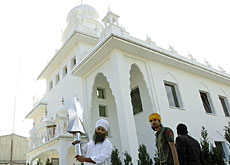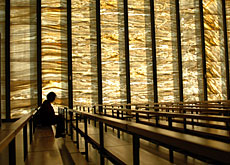
Religion becomes an issue at elections

Religion was a campaign theme in Switzerland's 2007 federal elections, even though this did not reflect trends in Swiss society.
If anything, the Swiss are becoming more secular, and analysts say the decision by some politicians to focus attention on Islam has more to do with strategy than faith.
Religion has been an insignificant factor in Swiss politics in recent years. Even the biggest mainstream party with any connection to religious considerations, the Christian Democrats, has been toying with the idea of removing the Christian label.
“Some of its members wonder if they can carry that tag if they want to represent everybody,” said Jörg Stolz, a professor of sociology at Lausanne University.
“It’s a big step to change a party name, though, since the Christian Democrats have a large voter base among Catholics.”
According to census results, Swiss society has become more secular and the religious landscape more diverse. Christianity no longer dominates Switzerland as it did in the past. The social role that churches traditionally played has also become less of a factor in everyday life.
“Many people’s problems can now be solved in a non-religious way,” Stolz told swissinfo. “If you suffer from a mental problem, you can see a psychotherapist [for example.] And if you lose your job, there are unemployment benefits.”
Political comeback?
Yet religion seems to be making a comeback on the political stage, thanks to politicians from the rightwing Swiss People’s Party.
Their attempt to force a nationwide vote on banning the construction of minarets, which they say threaten religious peace and create more trouble than they are worth, has put faith for better or worse in the spotlight.
Historically, religion has played an important role in Swiss politics, with domestic wars often centred on religion and the opposition between Catholics and Protestants. Modern Switzerland was founded in 1848 after the last such conflict.
But Stolz says rightwing politicians are simply playing politics this time around and are not interested in religion as such.
“The People’s Party is just recycling their favourite theme which is the fear of foreigners,” he said. “In this case it is Islam that is foreign, so the old slogans are being re-used with Islam being designated as the target.”
Officially, there are only two parties at the national level that claim to be based on religious values: the Protestant Party and the Federal Democratic Union. Together, they hold a total of five seats out of 200 in the House of Representatives, the parliamentary chamber that represents the people.
No Christian lobby
Strong religious representation in parliament has fallen by the wayside over the years. Unlike in the United States, there are no strong Christian lobby groups than can influence policy, according to Stolz.
“The Christian Democrats are still strongly supported by Catholics, but its positions do not support Church doctrine anymore, apart from its position on family values,” he said.
Stolz admits that the Protestant Party might gain a few voters in the upcoming election but says that its supporter base is unlikely to grow significantly given its limited appeal.
He feels that some voters might agree with policies on issues such as sexual morals, but will disapprove of others.
Much the same can be said about the Federal Democratic Union, which is close to the People’s Party on some points, such as the treatment of foreigners.
Stolz feels that faith-based parties cannot expect the political success the Christian conservative movement has enjoyed in the US, with religion not at the top of the list of people’s preoccupations.
“I wouldn’t say God is dead, because plenty of people still maintain they believe in him or a higher power. But he isn’t as healthy as he was in the 1950s,” he adds.
swissinfo, Scott Capper in Lausanne
Religious belief in 2000
Protestants (in thousands): 2569.1
Roman Catholics: 3047.9
“Old” Catholics: 13.3
Orthodox: 131.9
Other Christian communities: 14.4
Jewish: 17.9
Muslim: 310.8
Other churches and religious communities: 57.1
No religious affiliation: 1125.6
Swiss population in 2000: 7288.0
The roots of the Christian Democrats go back to the conservative, Catholic milieu of the 19th century.
The party was first represented in the cabinet in 1891 and gained a second seat in 1919. It has officially been known as the Christian Democratic Party since 1970.
Founded in 1917 in canton Zurich, the Protestant Party won its first seat in the national parliament in 1919.
For many years the party was the Protestant opposition to the Catholic conservatives. Since 1971 its share of the votes has been constant at about two per cent.
The Federal Democratic Union, founded in 1975, is considered an ultra-conservative Christian party. It won its first seat in parliament in 1991.

In compliance with the JTI standards
More: SWI swissinfo.ch certified by the Journalism Trust Initiative





































You can find an overview of ongoing debates with our journalists here . Please join us!
If you want to start a conversation about a topic raised in this article or want to report factual errors, email us at english@swissinfo.ch.